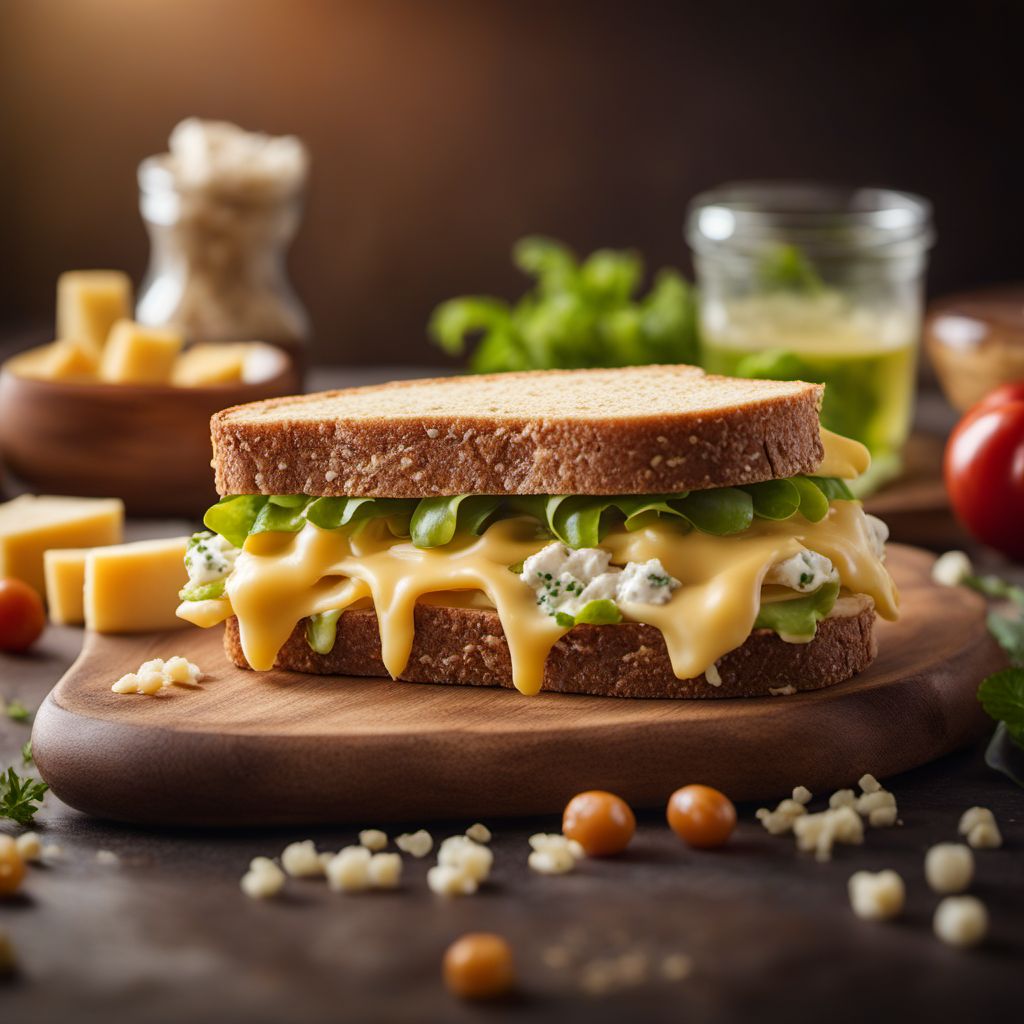
Ingredient
Sandwich with cheese topping/filling
"Melting Delights: Elevate Your Sandwiches with Irresistible Cheese Toppings and Fillings"
A sandwich with cheese topping or filling is a delightful combination of bread, various fillings, and a generous layer of cheese. The cheese can be melted, grated, sliced, or spread, depending on the desired texture and flavor. It adds a rich and creamy element to the sandwich, enhancing its taste and providing a satisfying mouthfeel. The cheese can range from mild and melty varieties like cheddar or mozzarella to more robust and tangy options like blue cheese or feta. The choice of cheese can greatly influence the overall flavor profile of the sandwich, making it a versatile ingredient that can be customized to suit different preferences.
Origins and history
The concept of sandwiches dates back to ancient times, but the addition of cheese as a topping or filling is believed to have originated in the United States during the 1920s. The popularity of cheese-topped sandwiches soared with the invention of processed cheese, which made it easier to achieve a gooey and melty texture. Since then, sandwiches with cheese toppings or fillings have become a staple in American cuisine and have gained popularity worldwide.
Nutritional information
A sandwich with cheese topping or filling provides a good source of protein, calcium, and essential vitamins. The nutritional content may vary depending on the type and amount of cheese used, as well as the other ingredients in the sandwich.
Allergens
Cheese toppings or fillings may contain allergens such as lactose and casein, making them unsuitable for individuals with lactose intolerance or dairy allergies.
How to select
When selecting cheese for sandwich toppings or fillings, opt for high-quality varieties that suit your taste preferences. Look for cheese that is fresh, free from mold or discoloration, and has a pleasant aroma. Consider the texture and melting properties of the cheese, as different types will yield different results when used as a topping or filling.
Storage recommendations
To maintain the freshness and quality of the cheese, store it in the refrigerator in its original packaging or wrap it tightly in plastic wrap. Avoid exposing the cheese to air, as it can cause it to dry out or develop mold. Use the cheese within its recommended shelf life for optimal taste and texture.
How to produce
Amateur cooks can easily create a sandwich with cheese topping or filling by selecting their preferred bread, fillings, and cheese. Simply assemble the sandwich, add the desired amount of cheese, and cook it using a method such as grilling, toasting, or baking until the cheese is melted and the sandwich is heated through.
Preparation tips
To achieve a perfectly melted cheese topping or filling, it is recommended to bring the cheese to room temperature before adding it to the sandwich. This allows for even melting and ensures a gooey texture. Experiment with different cheese varieties to discover unique flavor combinations and try grating or shredding the cheese for faster melting. Additionally, consider pairing the cheese with complementary ingredients such as sliced tomatoes, caramelized onions, or crispy bacon to enhance the overall taste of the sandwich.
Culinary uses
Sandwiches with cheese toppings or fillings are incredibly versatile and can be enjoyed in various forms. They can be as simple as a classic grilled cheese sandwich or as elaborate as a gourmet panini with a medley of ingredients. Cheese toppings or fillings can also be added to burgers, wraps, or quesadillas to elevate their flavor and texture.
Availability
Sandwiches with cheese toppings or fillings are commonly available in countries worldwide, as cheese is a widely consumed ingredient.
More ingredients from this category

Sandwich with processed meat topping/filling
The Savory Delight: Exploring the World of Processed Meat Sandwiches

Sandwich with cheese and vegetable topping/filling
"Garden Delight: A Scrumptious Sandwich with Cheesy Veggie Goodness"

Sandwich with cheese, egg and vegetable topping/filling
Elevate Your Lunch: A Gourmet Sandwich Delight

Sandwich with fish and vegetable topping/filling
Oceanic Delight: A Wholesome Fish and Veggie Sandwich

Doner kebab
The Savory Delight: Unraveling the Secrets of Doner Kebab

Sandwich with meat and vegetable topping/filling
The Ultimate Stacked Delight: Meat and Veggie Sandwich

Steak sandwich
Savory Delight: The Perfect Steak Sandwich

Hot dog with bread
The Classic Comfort

Sandwich with fish topping/filling
Ocean Delight Sandwich

Hamburger with bread
"The Classic American Delight: Juicy Hamburger on a Soft Bun"

Sandwich with vegetable topping/filling
Vibrant and Wholesome: Vegetable-Topped Sandwiches